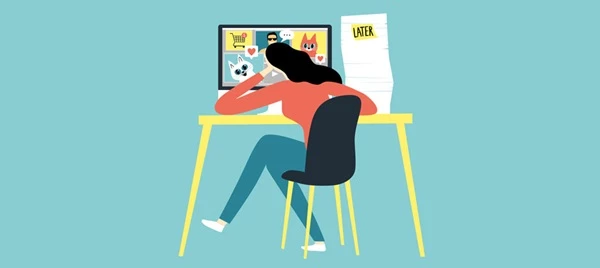Beyond laziness: Understanding the science of procrastination
The summer of 2023 was the hottest in 2,000 years / Studies reveal the critical role of sleep in the formation of memories
"Why did I not do this when I still had the time?" Whether it's filing taxes, meeting a work deadline, or cleaning the flat before a family visit, most of us have wondered why we put off certain tasks, even when the consequences are unpleasant. Why do we make decisions that are harmful to ourselves, despite our better knowledge?
That is the exact paradox of procrastination. Procrastination has been connected to a number of mental health problems in addition to decreasing productivity. Therefore, it is worthwhile to investigate the true nature of this widely discussed phenomenon as well as why it has such a strong hold on us.
According to computational neuroscientist Sahiti Chebolu of the Max Planck Institute for Biological Cybernetics, "procrastination is an umbrella term for different behaviours." "If we want to understand it, we need to differentiate between its various types."
One common pattern is that we deviate from our own decisions. For example, we might set aside an evening for the tax return, but when the time comes, we watch a movie instead. When we do not commit to a time in the first place, it could be because we are waiting for the right conditions. There are many different ways to procrastinate; for example, one may start a task later than expected or quit midway through. Chebolu categorised these patterns and offered potential reasons for each, including underestimating the amount of time required or shielding one's ego from potential failure.

The short-sighted brain
Can a classification like this actually help you accomplish tasks? Chebolu believes that the first step in solving the problem is to understand the mechanism at work with mathematical precision. She presents delaying as a sequence of temporal choices. Making decisions can be explained by the idea that our brain totals the benefits and drawbacks of the various actions we could take, like watching a movie or completing tedious paperwork. It then, quite naturally, chooses the action that seems most likely to be enjoyable in the long run.
One crucial point to note is that the brain gives future consequences less weight when calculating the sum of positive and negative outcomes. This is reasonable to some extent—after all, the farther future is inevitably full of unknowns - and even helpful. "Only when we place excessive value on experiences in the present and not enough on those lying further ahead," Chebolu explains, "such a decision-making policy becomes quickly maladaptive."
Just lazy?
Chebolu investigated real-world procrastination using extensive datasets from New York University. A log of the students who had to put in a certain number of hours of experimentation over the course of a semester was displayed in the data. Some people completed the task immediately, others spread it out evenly over a few weeks, and, sure enough, some people put it off until it was almost too late. Chebolu used simulations to mimic their actions. She inquired as to which theories could most effectively explain various procrastination patterns.
We could be tempted to blame our brain's predilection for activities that provide instant gratification. However, Chebolu discovered several explanations for every pattern of task postponement by the New York students, suggesting that there is undoubtedly more going on. "Uncertainty is another major factor in procrastination," she points out. This may be the result of our inability to estimate the amount of time required to locate every receipt for deductible expenses. However, uncertainty can also mean that we don't believe in our own skills or that the task will help us reach our objectives.
Chebolu is certain that interventions can be more effective if we recognise procrastination as a sequence of temporal decisions and identify the situations and reasons we typically err. In the event that you find, for example, that your brain has an excessive bias towards immediate gratification, rewarding yourself with short-term gains could be beneficial. If you find that you underestimate how much time you need for your menial tasks, you might want to try setting time-bound goals for yourself. Additionally, if you frequently give up on your chores, you might want to stay away from environments that are distracting.
No matter which category of procrastination you fall into (and you almost certainly do at times), you are not simply lazy. Acknowledging this and pardoning yourself for previous instances of procrastination are a smart starting point for increased productivity.
Journal Reference: Chebolu, Sahiti; Dayan, Peter. Optimal and sub-optimal temporal decisions can explain procrastination in a real-world task. Proceedings of the Annual Meeting of the Cognitive Science Society, 2024, Volume 46 DOI: 10.31234/osf.io/69zhd
End of content
Không có tin nào tiếp theo

